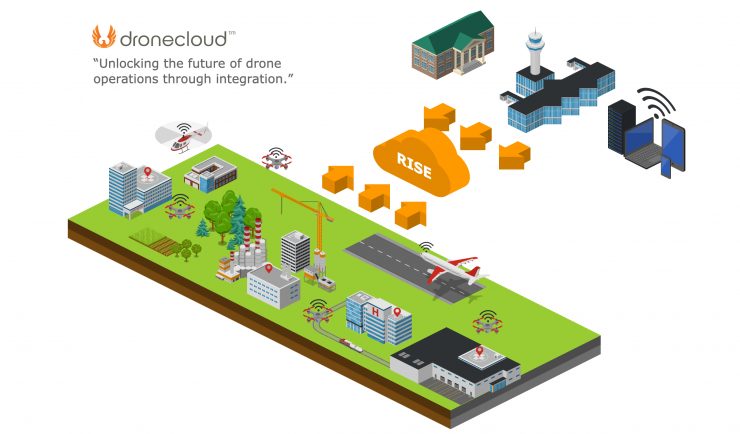Project Rise is among 20 winning ideas to receive a share of GBP7 million UK government funds under the Future Flight Challenge initiative. UK Research and Innovation is investing GBP33.5 million in Future Flight Challenge aimed at increasing mobility and UK manufacturing opportunities. Project Rise has received a grant of GBP500,000 to support field trials of a UAS delivery operation beyond visual line of sight (BVLOS) drone flights at Cranfield University test facility.
Project Rise aims to aims to integrate evolving Unmanned Traffic Management (UTM) with the control systems onboard drones. It will then form part of a Centralised Command and Control Solution, based on the Dronecloud Software as a service (SaaS) platform. The project is part of an overall effort across the drone industry to integrate disparate systems at scale, to achieve safer, more reliable and auditable drone flights, even beyond the line of sight.
Drone Management Software provider DroneCloud is leading the Project Rise consortium to support BVLOS drone flights. The consortium is composed of key industry partners, including Sky-drones, Cranfield University and Skyports.
Project Rise will develop an integrated software and hardware hub proof of concept. The complete system will include Unmanned Aircraft Systems (UAS) hardware, ground control stations, flight commissioning and planning, flight control and telemetry, deconfliction services, supplementary data feeds, airspace authorisations, flight noticeboard, Electronic ID, auditability, flight termination, accident and incident reporting, and digital flight logging. The project will culminate in field trials of an UAS delivery operation supporting BVLOS drone flights at the Cranfield University test facility. The system will work within the Open UTM framework to identify and create open system integrations that will be transferrable to the wider drone industry.
Speaking of the project, Dronecloud Co-founder and CEO, Jan Domaradzki, said: “Moving beyond the hype to integrate drones into congested urban airspace remains a tough nut to crack, and that’s a good thing. It’s our job to create the behind the scenes systems that will ensure it can happen safety at scale, in order to win the trust of the public and regulators. It’s a great honour for the team at Dronecloud to gain the backing of the Future flight challenge to form this consortium. We’re looking forward to creating the infrastructure for the aerial highways of the future.”
For more information visit:




